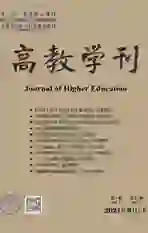古代汉语“课程思政”实施路径的探索与实践
2021-10-14郭洪丹
郭洪丹
摘 要:“课程思政”是当前高校一种新型的教育理念,其通过挖掘和凝练高校各类课程中的“思政元素”,使其以一种隐性的方式与高校的“思政课程”一道,共同发挥育人的目的。为了贯彻落实习总书记在全国高校思想政治座谈会上的讲话精神,在教育部的大力倡导下,我校已积极投入到“课程思政”的教学改革之中。古代汉语在人文学科中所占据的基础地位和其课程性质,决定其“课程思政”改革势在必行。在古代汉语“课程思政”建设的过程中,我们注重挖掘和凝练其中蕴含的“思政元素”,整合教学内容,优化教学方法,并对思政教学的实施路径展开积极的探索和实践。
关键词:古代汉语;课程思政;实施路径;探索;实践
中图分类号:G641 文献标志码:A 文章编号:2096-000X(2021)27-0173-04
Abstract: "Curriculum ideological and political education" is a new educational concept in colleges and universities at present. It explores and condenses the "ideological and political elements" in all kinds of courses in colleges and universities, so that it can play the purpose of educating people together with the "ideological and political curriculum" in colleges and universities in a hidden way. In order to implement the spirit of General Secretary Xi's speech at the National University Ideological and Political Symposium, under the vigorous initiative of the Ministry of Education, our school has actively engaged in the "curriculum ideological and political education" teaching reform. The basic position of ancient Chinese in the humanities and the nature of its curriculum determine that the ideological and political reform of its curriculum is imperative. In the course of the curriculum ideological and political construction of ancient Chinese, we pay attention to excavate and condense the "ideological and political elements" contained therein, integrate teaching content, optimize teaching methods, and actively explore and practice the implementation path of ideological and political teaching.
Keywords: ancient Chinese; curriculum ideological and political education; implementation path; exploration; practice
立德樹人是高等学校教育教学工作的根本任务。习近平总书记在全国高校思想政治工作会议上强调:“要用好课堂教学这个主渠道,思想政治理论课要坚持在改进中加强,提升思想政治教育亲和力和针对性,满足学生成长发展需求和期待,其他各门课都要守好一段渠、种好责任田,使各类课程与思想政治理论课同向同行,形成协同效应。[1]”为了贯彻落实习近平总书记的讲话精神,在国家教育部的大力倡导下,各大高校开始积极开展“课程思政”建设,探索“课程思政”改革方法,与“思政课程”同向同行,共同承担起思政育人的任务,这对于高质量课堂教学的建设和高水平人才的培养意义重大。
一、“课程思政”提出的背景
“课程思政”这种新型的教学理念,最早是由上海市委、市政府于2014年提出的,即“要深入挖掘各类课程的思政教育资源,将思政教育理念贯穿于教研全过程,构建思想政治理论课、通识类课程、专业课程(包括实践类课程)三位一体的‘大思政课程战略体系。[2]”这一教学理念,是为了解决高等教育中存在的德育和智育相脱节的“两张皮”现象。由于种种原因,在高校的教育教学中,往往较为重视知识的传授和能力的培养,在一定程度上缺乏价值的引领和精神的塑造。针对这一现象,上海市率先将德育纳入教育综合改革重要项目,并积极探索从“思政课程”到“课程思政”的转变。
二、“课程思政”的内涵
“课程思政”是一种新型的教育教学理念,即指高等学校中的思想政治教育工作,不应再单纯依靠大学开设的思政课程这种显性的教育方式,而是所有课程都应参与到思想政治教育工作中来,深入挖掘各门课程所蕴含的思想政治元素、价值理念、精神追求,使其以一种隐性的教育方式,与思政课程同向同行,互为补充,协同育人。2016年12月,习近平总书记在全国高校思想政治工作会议上强调:“要坚持把立德树人作为中心环节,把思想政治工作贯穿教育教学全过程,实现全程育人、全方位育人,努力开创我国高等教育事业发展新局面。[1]”2019年3月,习近平总书记在学校思想政治理论课教师座谈会上强调指出:“要坚持显性教育和隐性教育相统一,挖掘其他课程和教学方式中蕴含的思想政治教育资源,实现全员全程全方位育人。[3]”在这两次会议上,习近平总书记对“课程思政”的本质、方法和目的进行了阐述,由此进一步丰富了高校思想政治教育的内涵和外延。
